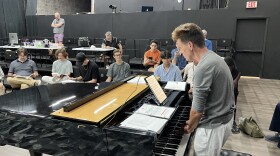Relocating Hamlet from the late medieval Danish court to a backyard barbecue in the contemporary American South, playwright James Ijames has turned Shakespeare’s tragedy into a comedy where no one dies at the hand of another.
Of course, the king, named Pap here and not royal but instead a prison inmate, has been murdered by his brother Rev -- Claudius in the original -- before the action of the play starts. The barbecue is a celebration of Rev’s marriage to Pap’s widow, Tedra, aka Gertrude.
One of the major themes in Fat Ham, which won the Pulitzer Prize for drama in 2022, is the idea of “softness” as an alternative to all the killing. It’s embodied by Juicy, Ijames’ version of Prince Hamlet, Pap and Tedra’s gay, overweight son, who is now also his uncle’s stepson. Besides all the food, the play features karaoke and charades.
“James Ijames has taken this centuries-old tale and put it in a new container, and the new container is full of fun, frolicking and freedom,” says Vickie Washington, who is directing Fat Ham at Stage West in Fort Worth in a co-production that will move to the Dallas Theater Center in January.
“That’s the thing that I really want people to lean into and recognize, that it's about people discovering, fighting for and working through their stuff to get to their own freedom. Because sometimes our families keep us twisted.”
In the case of Juicy, he doesn’t feel seen, Washington says. “He's a young, Black, queer man in a family, especially the males, that are not embracing nor appreciative of, in fact, downright hostile to his being.”
Rather than the elders, the emphasis is put on the young characters, she says, including Juicy’s best friend Opal, née Ophelia, and her brother Larry, Shakespeare’s Laertes, who in Fat Ham is a member of the military.
“Softness is a word that’s thrown at him by Rev and Pap in a negative way. Larry helps him recognize the power of softness and how getting away from it has taken something away from him. Softness is wrapped in the matriarchy, and there’s a moment when the patriarchy, symbolically, is dismantled, because we need to be freed of it. For far too long, there are forces among us who are trying to drive us back to a world that is this narrow, that has no room for you, for me, for anybody that stands on that stage in Fat Ham.”
Fat Ham is the last entry in Black Broadway Summer, an accidental confluence of three plays by African American writers produced by North Texas troupes toward the end of this season.
It began in June with Soul Rep Theatre’s rendering of Fort Worth native Jordan E. Cooper’s satirical Ain’t No Mo’, an off-the-wall series of vignettes built around a high concept: The U.S. government is offering Black Americans a one-way ticket to Africa. It received six Tony nominations for its Broadway run.
Circle Theatre’s production of the Pulitzer winning musical A Strange Loop followed later in the month, directed by Washington. Her son, Djoré Nance, who is music consultant and co-dramaturg on Fat Ham, was the music director for Loop and was part of the cast of Ain’t No Mo’. And it’s not the only overlap.
Cherish Love, the Loop music supervisor, is in Fat Ham; Jori Jackson, who was in Ain’t No Mo’, is also in the cast of Fat Ham as Opal; and sound designer Cresent Haynes worked on both those shows as well. Washington also brought in a former student, Harold Steward, as assistant director and co-dramaturg. And she’s known Nikka Morton, who plays Tedra, since the actor was 14, directing her in Stage West’s 2022 production of What to Send Up When It Goes Down.
“A lot of the people in the show already know each other,” Washington says. “The vibe in the rehearsal space is very similar to the vibe in parts of the play. We brought in some barbecue, so we could have our own version of Fat Ham. At any moment, somebody would break out in an old school gospel tune or R&B.
“For me, it was a very necessary piece of theater. I do theater because I believe it has the power of transformation. I believe it has the power to save lives. I'm convinced that there will be someone who comes to see this production, just like someone who came to see A Strange Loop, and it will resonate with them in such a way that it helps them to move a little further on their journey.”
Details
Aug. 28-Sept. 14 at 821 W. Vickery Blvd., Fort Worth. $42.50-$52.50. stagewest.org.
Jan. 30-Feb 8, 2026 at Kalita Humphreys Theater, Dallas. $51 - $95. dallastheatercenter.org
Arts Access is an arts journalism collaboration powered by The Dallas Morning News and KERA.
This community-funded journalism initiative is funded by the Better Together Fund, Carol & Don Glendenning, City of Dallas OAC, The University of Texas at Dallas, Communities Foundation of Texas, The Dallas Foundation, Eugene McDermott Foundation, James & Gayle Halperin Foundation, Jennifer & Peter Altabef and The Meadows Foundation. The News and KERA retain full editorial control of Arts Access’ journalism.





